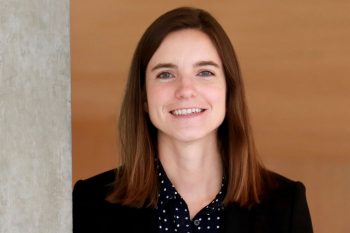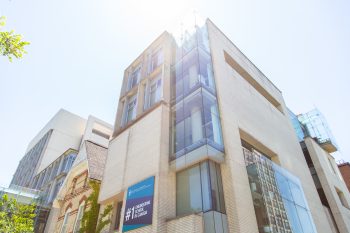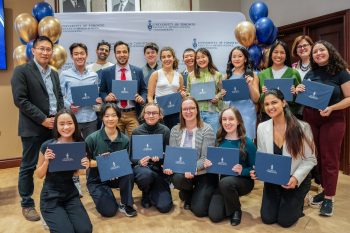Dean Cristina Amon (MIE) and Professors Michael Collins (CivE), Chul Park (MIE) and Peter Stangeby (UTIAS) have been elected Fellows of the Royal Society of Canada (RSC), one of Canada’s most prestigious academic honours. The RSC is the senior national body of distinguished Canadian scholars, artists and scientists. It consists of nearly 2,000 Fellows, who are selected by their peers for outstanding contributions to the natural and social sciences, the arts and the humanities.
This year’s new Fellows will be inducted into the RSC during the Induction and Awards Ceremony on Saturday, November 26, 2011 at the Ottawa Convention Centre in Ottawa.
Cristina Amon’s research pioneered the development of Computational Fluid Dynamics algorithms for formulating and solving thermal design problems subject to multidisciplinary competing constraints. This led to her creation of a multi-stage concurrent thermal design methodology based on hierarchical model refinement. Dean Amon’s research laid the scientific foundation by elucidating mechanisms of flow destabilization to induce heat transfer enhancement in self-sustained oscillatory flows and hemodynamics transport in biological systems. She has made pioneering contributions to concurrent thermal designs, innovation in electronics cooling and transient thermal management of wearable computers.
Michael Collins is internationally renowned for his contributions to the understanding of the nonlinear behaviour of reinforced and prestressed concrete structures and its application to the design of buildings, bridges, concrete offshore oil platforms, nuclear containment structures, and other heavy industrial facilities. His Modified Compression Field Theory, based on novel experimental techniques, has transformed the shear design of concrete structures from restrictive empirical procedures to rigorous, general, easy-to-follow models and has been used as the basis for widely-used computer programs such as Response-2000. His theories have been incorporated into design specifications all over the world.
A world leader in the field of plastic foaming, Chul Park holds a Canada Research Chair in Microcellular Plastics and is Founder and Director of the Microcellular Plastics Manufacturing Laboratory and the Centre for Industrial Application of Microcellular Plastics. Professor Park’s microcellular research has produced pivotal breakthroughs that have reshaped scientists’ knowledge of plastics engineering. He has identified the fundamental mechanisms that govern cell nucleation and foam expansion, enabling him to invent numerous novel technologies for polymer processing. His research has generated 20 patents, and hundreds of companies throughout the world have licensed his microcellular systems.
Peter Stangeby is internationally recognized as the world’s leading authority on the boundary physics of fusion energy research devices, particularly tokamaks. Fusion powers the sun and stars; the aim of nuclear fusion research is to create a potentially limitless terrestrial energy source. Professor Stangeby’s standing is due to his numerous foundational discoveries, his impressive record of publications in top-ranked journals, and his highly accomplished graduate students, many of whom now occupy key positions in the two largest international fusion research projects. His book The Plasma Boundary of Magnetic Fusion Devices has become the standard reference in tokamak boundary physics research.
“The unprecedented election of four of our faculty members to the Royal Society of Canada is a testament to the world-leading research taking place in the Faculty,” says Cristina Amon, Dean, Faculty of Applied Science & Engineering. “On behalf of the Faculty and all the newly inducted Fellows, I extend our deep gratitude to the Academy for this honour.”



